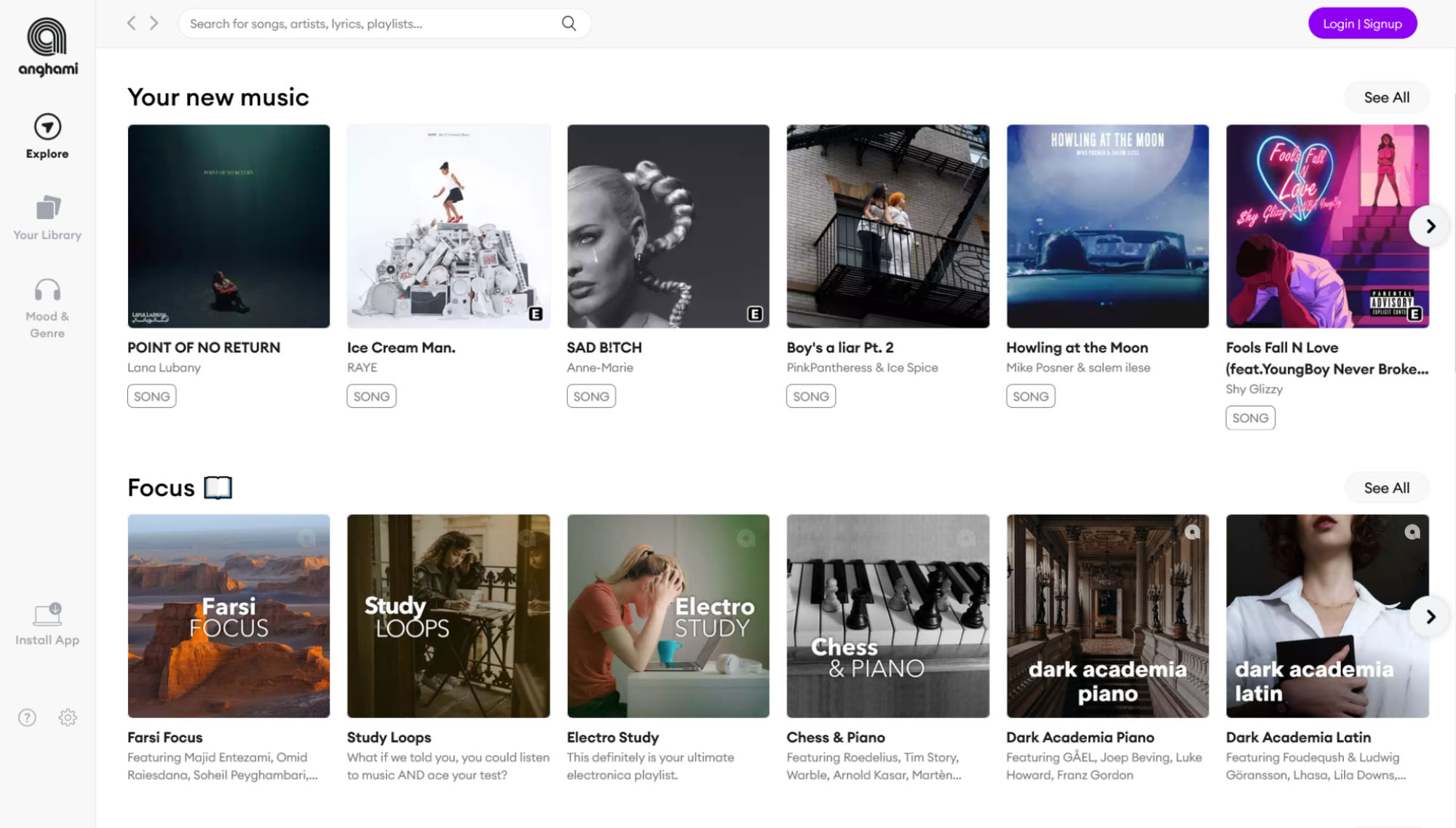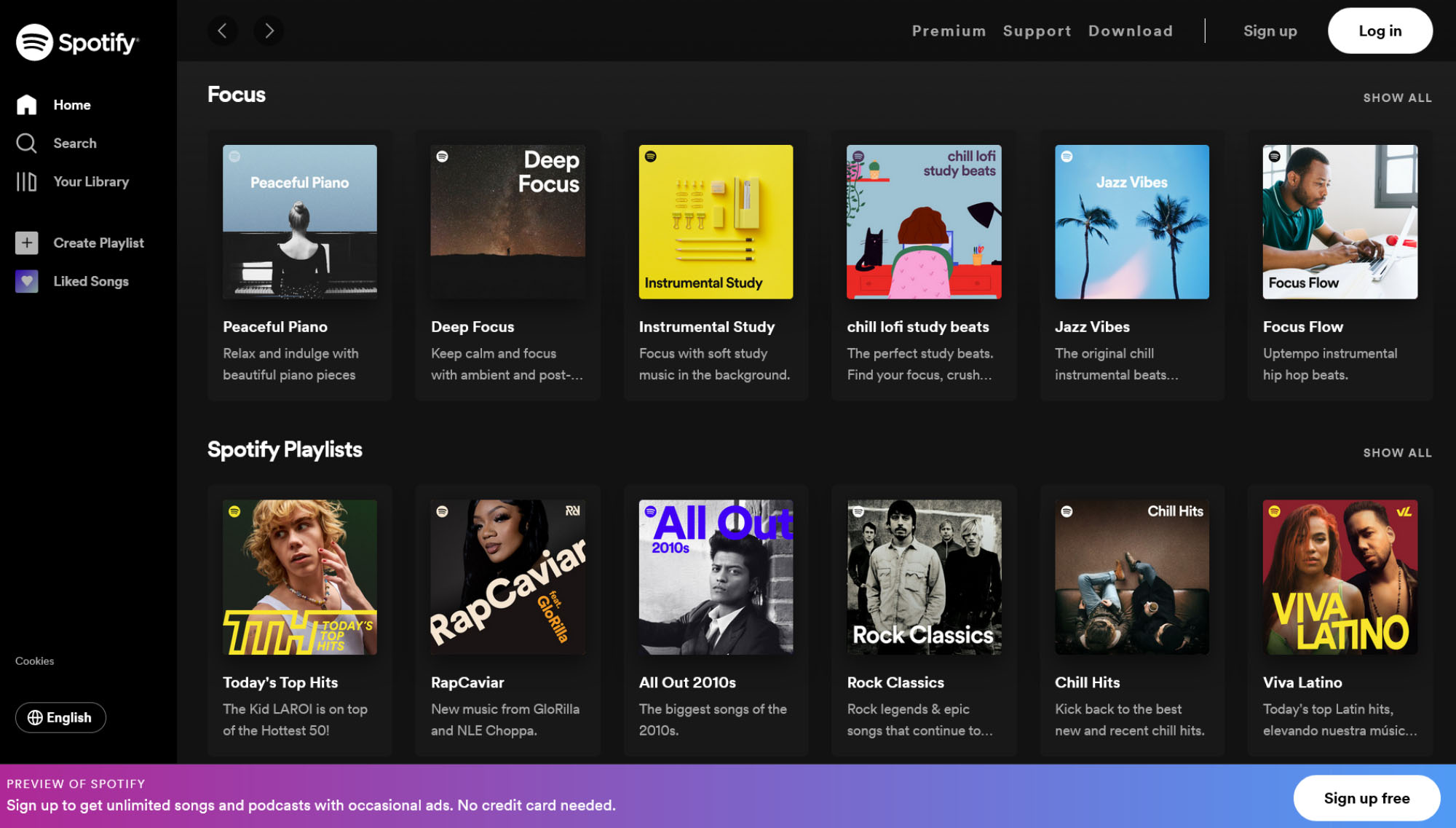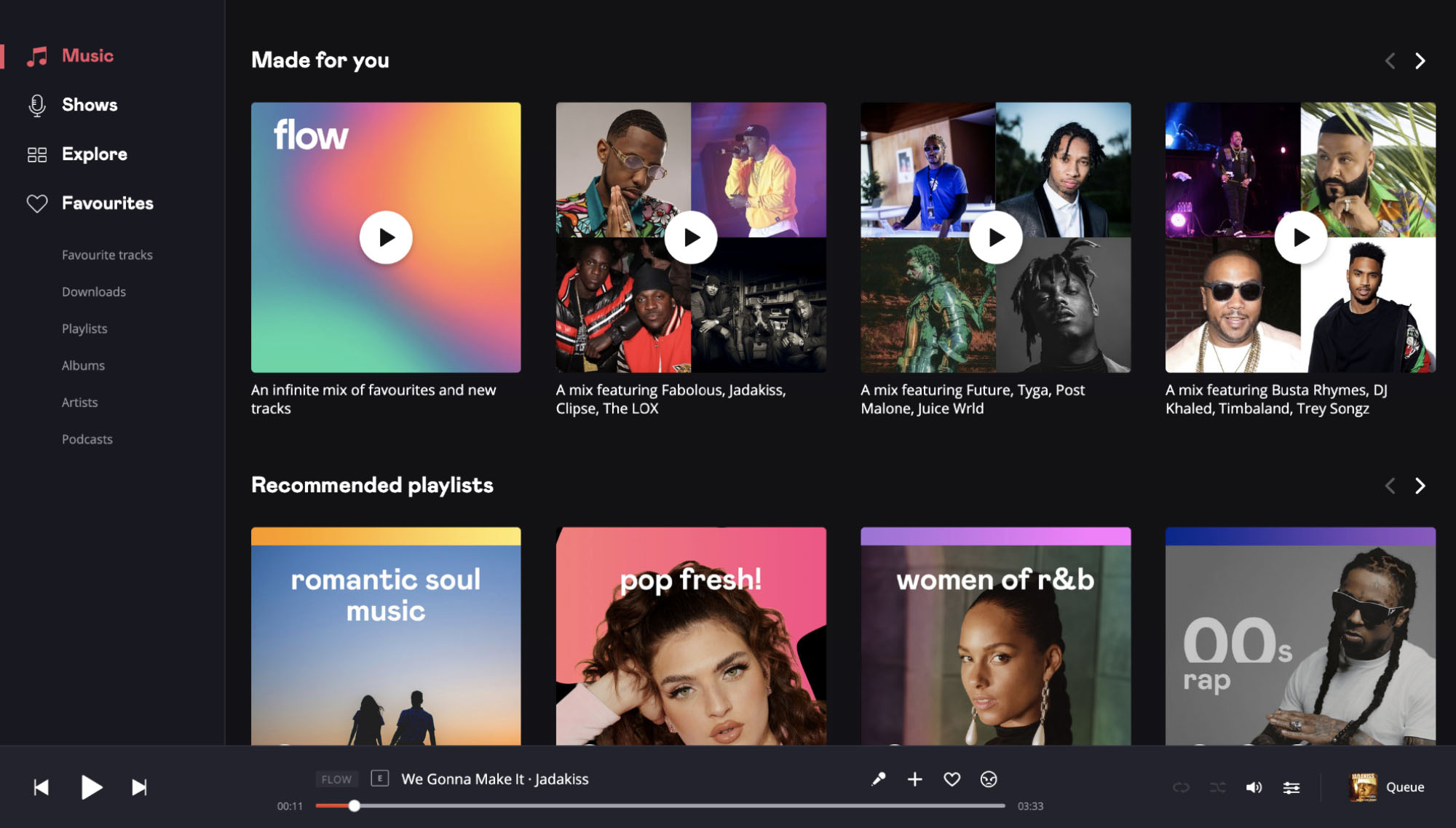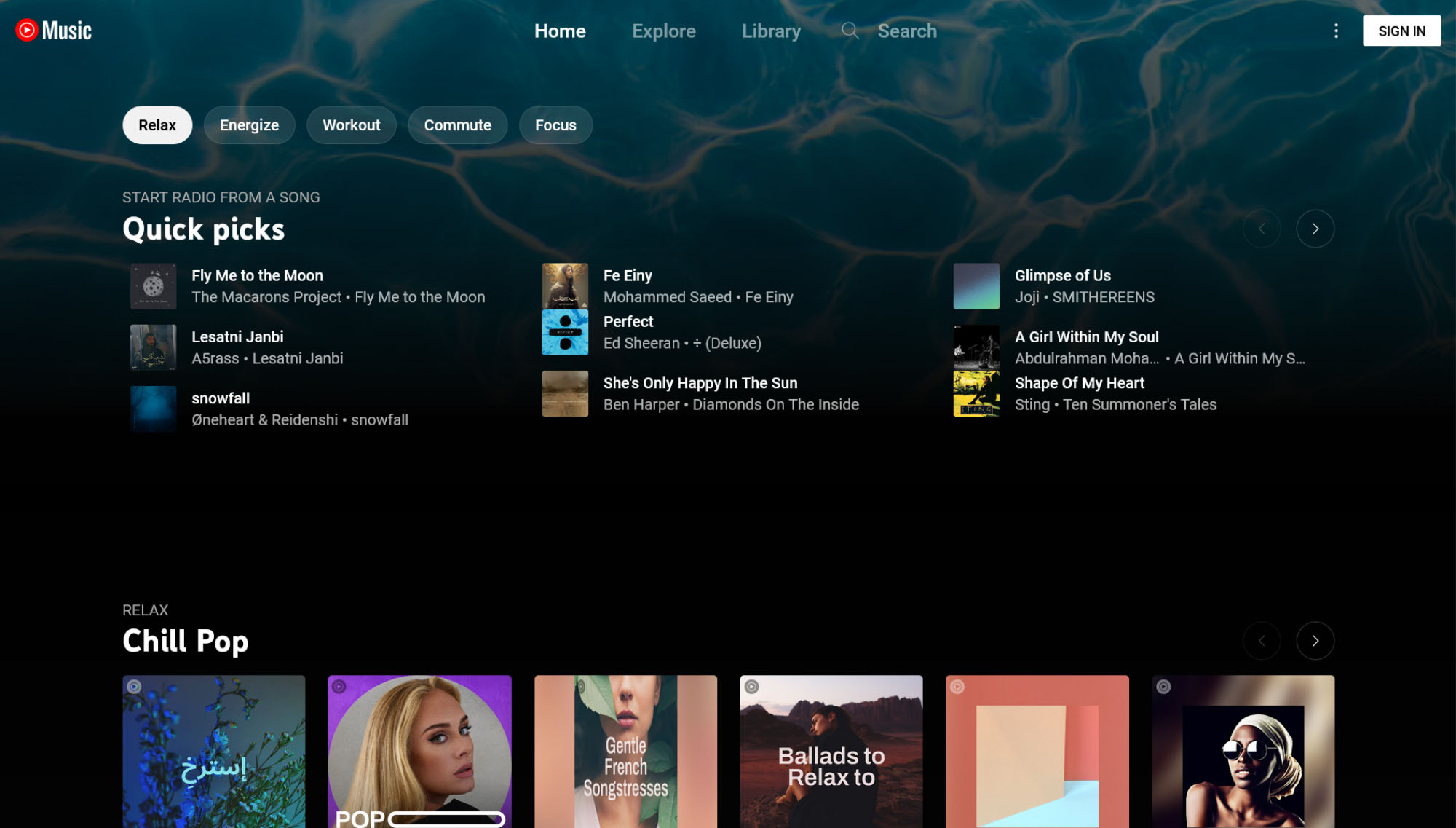Guides
Best Music Streaming Services In The Middle East
Whether you need some good music to listen to while at home, work, or the gym, these are the best music streaming services in the Middle East.

The music industry relies on royalties, and it protects its source of revenue by enforcing restrictive licensing terms that often limit the availability of songs to certain regions. Fortunately, there are multiple music streaming services that aim to bring artists from around the world directly to the ears of Middle Eastern listeners. We’ve taken the time to research them for you, and we can now present you with the following list of the best music streaming services in the Middle East.
Top 5 Most Popular Music Streaming Services In The Middle East
The music streaming industry in the Middle East and Africa region is set to grow from $1.5 billion in 2019 to $3.2 billion by 2027, and the five music streaming services described below collectively share the biggest slice of the lucrative pie.
#1- Anghami


Last year, Anghami cemented its role as the largest music streaming service in the Middle East when it revealed that the number of its active users had reached 19.5 million. Out of those, 1.3 million are paying subscribers. No wonder Anghami is often called the “Spotify of the Middle East.”
The music streaming service was launched in 2011 in Lebanon as the first legal music streaming platform in the Middle East, and it now provides the largest catalog of licensed music. Besides Arabic labels like Platinum Records and Melody, Anghami is also home to some of the largest international labels, such as Warner Music Group, Sony, and Universal.
Anghami is a freemium service, which means that users can listen to millions of songs for free and upgrade to the Anghami Plus plan ($4.99 per month or $44.99 per year) only when they decide to elevate their music-listening experience by unlocking the ability to listen offline, view lyrics, and much more.
#2- Spotify


Spotify is the king of the music streaming world, and the Middle East is part of its dominion. At the time of writing this article, Spotify’s vast content catalog includes over 80 million tracks, most of which are available to Middle Eastern listeners.
Discovering new regional content on Spotify is easy thanks to professionally curated playlists like Today’s Top Arabic Hits, Arabic EDM, and Oriental Chill Vibes. Besides them, there are countless of user-created playlists that can fit just about any mood.
Just like Anghami, Spotify is a freemium music streaming service with premium plans for individuals ($9.99 a month), couples ($12.99 a month), families ($15.99 a month), and students ($4.99 a month).
#3- Apple Music


Launched in 2015, Apple Music is a great choice for those Middle Eastern listeners who are already invested in the Apple ecosystem. You can purchase it on a monthly or annual basis as a standalone service or as part of the Apple One collection of services (starts at $12.95 a month).
In October 2022, Apple celebrated 100 million songs in the Apple Music library, which is an admirable number considering that the service is four years younger than Spotify.
Apple Music has been praised for helping its users discover great songs by highlighting new, interesting releases, sharing playlists curated by the Apple Music team, and providing tailored recommendations based on each user’s preferences. The subscription service also includes three live 24-hour radio stations (Apple Music 1, Apple Music Hits, and Apple Music Country), so it’s always easy to find something play-worthy.
#4- Deezer


France is home to good wine, picturesque vacation spots, world-famous cuisine, and also Deezer, a music streaming service that operates in over 180 countries around the world, including those located in the Middle East and North Africa (MENA) region.
Backed by Saudi billionaire Prince Alwaleed bin Talal, Deezer is known for its great sound quality, support for user-uploaded MP3s, accurate recommendations, and very active community of users who are actively shaping the service, making it better and better.
The free Deezer plan is powered by ads and provides access to over 73 million songs. Those who would like to enjoy unlimited, offline, ad-free music can upgrade to Deezer Premium ($11.90 a month) or Deezer Family ($19.48 a month).
#5- YouTube Music


In September 2022, YouTube announced that it had launched its music streaming service in Saudi Arabia, the UAE and five other markets. YouTube Music is available as a standalone subscription ($9.99 a month), and the service is also included in the YouTube Premium plan ($11.99 a month).
According to some estimations, YouTube Music has around 100 million tracks in its catalog, including albums, singles, videos, remixes, and live performances. Paying users can take advantage of ad-free playback, audio-only background playback, and the ability to download songs for offline playback.
YouTube Music has been criticized for having a disorganized user interface and lacking some popular music that’s readily available on competing services, but both of these issues will likely be resolved in the future.
Other Popular Music Streaming Services In The Middle East
Aside from the above-described heavyweights of the music streaming industry, there are several other platforms listeners in the Middle East should consider. These platforms stand out by offering unique features, approaches, or content.
Tidal
Tidal launched in the United Arab Emirates in February 2022, offering its collection of over 90 million songs and playlists. What sets this music streaming service apart from competitors is its focus on high-fidelity sound.
If you consider yourself to be an audiophile (or at least someone who can tell the difference between a low-bitrate and high-bitrate file), then you’ll appreciate the ability to stream in their original quality or lossless FLAC. Tidal also supports innovative immersive sound formats like Dolby Atmos or 360 Reality Audio.
SoundCloud
SoundCloud is a music streaming service that allows users from around the world to effortlessly upload their audio tracks and reach large audiences of listeners eager to discover talented artists before they make it big.
The service is based in Germany, and it’s estimated that its servers store more than 200 million tracks, so you’re guaranteed to never run out of music to listen to. In addition to listening, SoundCloud encourages its users to like, comment, and generally become active members of its vibrant community of music lovers.
Gaana
Over 3.4 million Indian expats are estimated to be living in the UAE alone, so it’s great that India’s largest commercial music streaming service, Gaana, is available worldwide. The service has more than 200 million monthly users, and it provides access to around 30 million songs.
Gaana is the most affordable music streaming service described in this article, priced at just $1.20 per month within India and $3.99 per month outside India. Unfortunately, there’s no free tier because Gaana is a subscription-only service.
Conclusion
The music streaming industry in the Middle East is thriving and projected to reach new heights in the coming years. Listeners in the region have many different platforms to choose from regardless of if they want to enjoy the greatest global hits or Middle Eastern classics. In this article, we’ve described the top 5 best music streaming services currently available while throwing in several extra recommendations for you to consider. If you’ve found what you’ve been looking for, you can kick back, put on some tunes, and let the music take you on a journey of discovery and relaxation.
Guides
The Most AI-Proof Career Opportunities In The Middle East
Concerned about AI’s impact on your career? Discover the most AI-proof job opportunities thriving in the Middle East and beyond.

The rise of artificial intelligence (AI) is sending shockwaves through the global workforce, transforming industries and displacing jobs at an unprecedented pace. Writers, graphic designers, web developers, transcriptionists, translators, and many others have seen their roles dramatically impacted in just the past two years (since the release of ChatGPT).
Given these rapid developments, it’s no surprise that people across the Middle East and other regions are increasingly looking for AI-proof their future. If you count yourself among them, you’ve come to the right place. In this article, we’ve thoroughly researched and compiled a list of career opportunities (presented in no particular order) that are likely to thrive in the Middle East despite the ongoing AI revolution.
Summary Of AI-Proof Career Opportunities:
| Career | Average Base Annual Salary (AED) |
| Artificial Intelligence Specialists | 171,000 |
| Maintenance Technicians | 48,000 |
| Doctors | 252,000 |
| Registered Nurses | 84,000 |
| Social Workers | 85,000 |
| Elementary And High School Teachers | 83,000 – 85,000 |
| Emergency Responders | 100,000 |
| Skilled Tradespeople | 60,000 |
Artificial Intelligence Specialists

It’s probably no surprise that one of the most career opportunities in the Middle East lies in the heart of the AI industry itself. The AI boom has naturally led to a surge in demand for professionals who have a deep understanding of the technology and can develop, implement, and troubleshoot AI systems.
In the United Arab Emirates, the number of AI workers quadrupled to 120,000 from 2021 to 2023, according to Al Olama, the UAE’s AI Minister, as the country pushes forward with its ambitious goal of becoming a global AI hub by 2031. The UAE is investing heavily in AI education and research, establishing dedicated AI universities and research centers to nurture local talent and attract international experts.
To become an AI specialist, you need to have a strong foundation in computer science, mathematics, and statistics. That’s why most AI specialists hold at least a bachelor’s degree in one of these fields, although many also pursue advanced degrees such as a master’s or Ph.D. to deepen their expertise and stay at the forefront of the rapidly evolving AI landscape.
Maintenance Technicians

The impact of AI extends far beyond the digital realm, as advanced robotics and intelligent machines are poised to revolutionize the physical world. Multiple companies, including Boston Dynamics, Tesla, and Figure AI, are working on developing general-purpose humanoid robots capable of performing a wide range of tasks guided by advanced AI reasoning.
As these sophisticated machines become more prevalent, they are expected to take over an increasing number of jobs in warehouses, factories, and hazardous environments. While this may lead to the displacement of some human workers, it also creates a growing demand for skilled maintenance technicians who can keep these complex systems running smoothly.
To succeed in this field, aspiring maintenance technicians should consider pursuing vocational training or a degree in mechatronics, robotics, or a related field. Hands-on experience through internships, apprenticeships, or industry collaborations can also be invaluable in developing the practical skills needed to excel in this role.
Doctors

In the Middle East, countries like Saudi Arabia, Qatar, and the UAE have shown a particularly strong willingness to embrace AI in healthcare, with two-thirds of their populations open to the idea of replacing doctors with robots, compared to just 55% across Europe, the Middle East, and Africa as a whole, according to a PwC study (PDF).
However, despite the rapid advancements in AI technology, doctors are unlikely to be made obsolete anytime soon. Instead, AI will become an invaluable tool that complements and enhances the expertise of medical professionals, enabling them to provide better care to their patients.
AI is already being used in various healthcare applications, from accelerating the development of new cures, enhancing disease detection, and improving patient outcomes. These developments have not gone unnoticed by UAE leaders, with the country’s National Artificial Intelligence Strategy 2031 placing significant emphasis on the healthcare field and the Ministry of Health and Prevention (MoHAP) launching the UAE health sector’s first Centre of Excellence (COE) for AI in October 2023.
Registered Nurses

Just like doctors, registered nurses are unlikely to be replaced by AI anytime soon, despite the development of robot nurses. The human touch, care, and empathy provided by nurses are invaluable, especially during times of sickness and vulnerability.
In fact, the demand for registered nurses in the Middle East is growing rapidly due to the region’s expanding population and the increasing healthcare needs of an aging demographic.
A recent report on the impact of AI on the Middle Eastern healthcare landscape predicts that the UAE will require an additional 15,000 nurses and allied health professionals in Abu Dhabi and 11,000 nurses in Dubai by 2030 to keep pace with the country’s healthcare needs. As a result, registered nurses can expect ample job opportunities in the Middle East, with AI serving as a tool to enhance their work rather than replace them.
Social Workers

The role of social workers is expected to remain essential and largely unaffected by automation. Social workers provide crucial support, guidance, and advocacy for individuals, families, and communities facing challenging circumstances, and the demand for their services is growing in the Middle East.
According to a recent statistic, the revenue of the human health and social work activities industry in the UAE is projected to reach approximately 5.9 billion U.S. dollars by 2024. This growth indicates a promising future for social workers in the region, as their skills and expertise will be increasingly sought after to address the diverse needs of the population.
For example, social workers have career opportunities in special needs centers, schools, geriatric and psychiatric hospitals, and other social service organizations. Depending on the specific role, such as social therapist, school counselor, or special needs teacher, obtaining a license may be required.
Elementary And High School Teachers

While AI is set to play a significant role in the education sector, it’s extremely unlikely to replace teachers entirely. Instead, AI will augment and support the work of educators.
According to the World Economic Forum, AI can assist teachers by automating administrative tasks, such as grading and record-keeping, allowing them to focus more on personalized interactions with students and enhancing the overall quality of education. Another exciting application of AI in education is the personalization of learning content and experiences. AI-powered systems can adapt to individual students’ needs, learning styles, and abilities, providing tailored support and resources to optimize their learning outcomes.
This creates new opportunities for tech-savvy teachers and those willing to embrace AI in their teaching methods. A teacher who understands modern AI tools and knows how to incorporate them effectively into their lesson plans will be highly sought after.
Emergency Responders

The jobs of emergency responders, including firefighters, paramedics, and police officers, are very safe from AI automation. The critical, hands-on nature of their work, which often requires split-second decision-making, empathy, and adaptability in unpredictable situations, guarantees that human responders will remain essential even in the future.
However, AI has the potential to revolutionize emergency response by assisting responders in various ways. Companies like Omdena are pioneering AI solutions to improve emergency response management, preparedness, and response.
For example, Omdena’s AI models analyze historical data, weather patterns, and other factors to predict the likelihood of emergencies such as floods, wildfires, and earthquakes. They also help optimize resource allocation and coordinate the response of different agencies to improve the efficiency and effectiveness of disaster relief operations.
Skilled Tradespeople

In the short term, skilled tradespeople can rest easy knowing that AI won’t be fixing leaky toilets, unclogging drains, or rewiring electrical panels anytime soon. The complex problem-solving skills and dexterity required for these tasks are still beyond the capabilities of current AI systems.
However, the medium and long-term outlook for trades in the Middle East is more complicated. As AI disrupts various industries, many people are considering transitioning to trades as a safer career option. This influx of new workers could potentially increase competition and put downward pressure on wages, especially for entry-level positions.
Moreover, in wealthier parts of the Middle East, the demand for skilled tradespeople is often met by workers from South Asia who are willing to accept lower wages. Despite these challenges, established tradespeople with a strong reputation and a loyal customer base can still thrive in the AI era by providing high-quality work and excellent customer service.
Conclusion
Even though the AI revolution is expected to disrupt the entire job market and make many traditional career paths obsolete, there are still plenty of work opportunities in the Middle East remain resilient against automation. Generally, the most AI-proof career opportunities are those that either directly contribute to the development and implementation of AI technologies or require uniquely human skills such as empathy, creativity, and critical thinking.
-

 News2 weeks ago
News2 weeks agoSpace42 & Cobham Satcom Launch New Satellite Broadband Terminal
-

 News3 weeks ago
News3 weeks agoVernewell UK: Forging The Future Of Intelligence, Quantum, And AI
-

 News3 weeks ago
News3 weeks agoYasmina Smart Speakers Now Feature Ramadan-Specific Content
-

 News3 weeks ago
News3 weeks agoPure Electric Expands To UAE, Boosting Micro-Mobility Sector


















